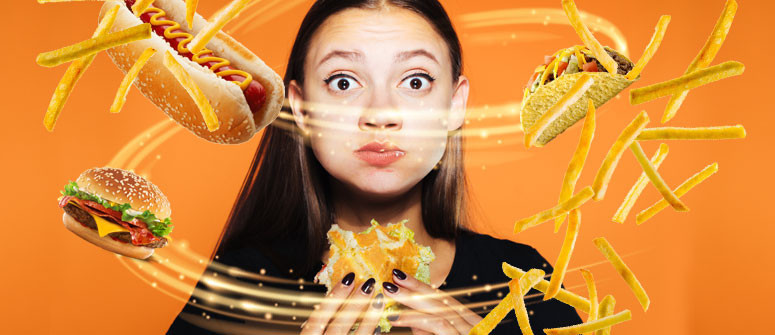Why and how does cannabis cause “the munchies? “

The "cannabis" munchies are a strange but well known phenomenon of smoking cannabis. Why does THC cause users to want to eat, even when full?
It is one of the best known stereotypes about smoking cannabis. It gives you the “Munchies.” But it’s not just any old food you crave. It is usually high-fat, high-sugar junk food.
Why is this the case?
New research into this effect is not only providing answers. It is also leading to more understanding of cannabis' affects the brain’s circuitry. A new report in Nature also seems to shed new light on the question. The new findings? The “munchies” are a result of cannabinoids on the brain itself.[1]
CANNABIS IS CAPABLE OF REROUTING BRAIN CIRCUITRY
Cannabinoids are clearly capable of changing brain perception. This also leads to changes in behaviour.
It also seems to act like a metabolic “switch.” In turn, that leads to not only improved mood and pain relief.
However, cannabis can also trigger the feeding impulse – even when they are full. Not only that, the brain also seems to think that the body is “starving.” That explains why stoned people can eat so much. It also helps explain why they gravitate to higher fat and sugar foods. The brain tells the body it needs energy. Cravings for the most calorie dense kinds of food are the result.
According to this research, cannabinoids impact the hypothalamus. Activation of neurons in then creates a “hunger” reflex. This happens even if the stomach is full.
The research team behind the Nature report also found evidence of something else. This concept was tested on surgically altered mice. The mice brains where these neurons had been incapacitated did not stimulate the gorge reflex. Non-altered mice however began to gorge themselves on food. Even when they were full.
This leads of course to the ultimate question at hand. How can cannabinoids switch body functions off and on – starting with the hunger reflex?
The answer now? Nobody knows.
WHAT ELSE RESPONDS TO CANNABINOID SWITCHING?
There is other research now adding to this larger theory. It also seems that ingesting cannabis also stimulates olfactory senses. In other words, when you are stoned, food also seems to smell better – also stimulating appetite.[2]
This line of research is not only going to help people understand appetite stimulation better. It may also lead to weight control drugs. However, because metabolism, hunger and mood are all stimulated along similar circuitry, merely “turning off” central cannabinoid receptors can have strange if not dangerous consequences.
Early research on cannabinoids to control appetite ended badly at the beginning of this decade. Seven years later, new research shows that this is still a valid field of interest. Stimulating peripheral receptors that do not cross the blood-brain barrier might hold the key to appetite controlling drugs.
WHAT ELSE DO I NEED TO KNOW?
The impact of the munchies, however, is a still a strange phenomenon. It is only seen in people who use cannabis occasionally and recreationally. It does not act the same way on people who use the drug medicinally. At least in the long term. Longer term use of cannabis tends to make “The Munchies” dissipate. Why this is, or when this happens still has an unknown cause.
That said, just this question is opening up new fields of inquiry in cannabis research.
Stay tuned.




